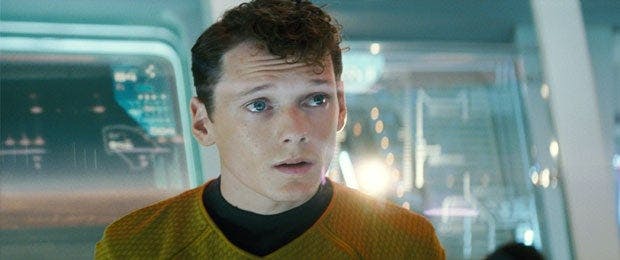Published Aug 16, 2011
Anton Yelchin Talks Star Trek and More - Part 1
Anton Yelchin Talks Star Trek and More - Part 1

Anton Yelchin was already one of Hollywood’s most exciting young talents when he signed on to play Pavel Chekov in Star Trek (2009), having logged film and television credits that included Hearts in Atlantis, Alpha Dog, Huff and Charlie Bartlett. Since playing Chekov in the J.J. Abrams blockbuster, he’s appeared in Terminator Salvation, The Beaver and the August 19 release, Fright Night. StarTrek.com recently caught up with the 22-year-old during a break from shooting his next movie, Odd Thomas, for an exclusive conversation in which he talked about Star Trek, Fright Night, Odd Thomas and his penchant for mixing indie features and studio productions. Below is part one of the interview, and check back tomorrow for part two.
Let’s start with Star Trek. How pleased were you with the finished film and also by the reaction of the fan base to it?
Yelchin: I think it’s a great film. I think it’s a really good film. I think it’s a very enjoyable summer experience. It’s light and exciting, and everything works about it. I’m a big fan of everyone’s performances. And I’m pleased that people liked it, too.
Walter Koenig originated the role, of course. So, what did it mean to you to get Koenig’s blessing on your casting and performance, and then also to actually meet the guy?
Yelchin: Oh, that was huge. When you’re taking on something that’s been made iconic by an individual, and for so many years, there’s always that sort of desire, I guess in some selfish way, to gain their approval. It would suck if he came up to me and was like, “I f--king hate you. That was terrible, and I don’t like you.” That’d be awful. But I’m so glad that he liked the work that I did, and to meet him was really great. It was really a very important thing for me.
Your version of Chekov was introduced as a character that’s very young, very green and also quite capable. What do you hope to see for him in the next film?
Yelchin: I don’t know. I trust the people that are writing it. They wrote a good film and a good character the first time around, and I enjoyed doing that. So I trust that they’ll find some mission for me to do in the next one.
There’s a very good chance that you could be playing Chekov over the course of several films. Do you see your performance, in a way, building to Koenig’s portrayal? Or are they separate characters and, thus, separate performances?
Yelchin: I don’t know if it builds to Walter’s Chekov, that if we make more films then suddenly it’ll totally become that guy. I just think that I tried to capture as close as possible all of the great qualities that Walter brought to his Chekov. So I hope there’s a continuity. I don’t know if it’s necessarily an evolution, but I hope there’s a continuity where you can say, “Oh, yeah, I buy that person being that age.”
Your next film is Fright Night, which is a remake of the 1980’s horror film of the same name. You’re playing Charley Brewster, the kid who thinks his new neighbor, Jerry (Colin Farrell), is a vampire – and Charley is all too right. Some directors, when they’re prepping a remake, tell their actors to avoid the original at all costs, while other directors encourage it. What did Craig Gillespie (who directed the remake) say to you about watching the original Fright Night?
Yelchin: Nobody said anything to me. That’s just how I work. If there’s something else that’s out there that’s info about the movie or that contributes to the context of what we’re doing, I look into it.
Charley is cool, popular, and dates the girl (Imogen Poots) everybody wants, which is quite different from the Charley seen in the original film. How important was it to you that he not lose his geek/nerd edge, so that the audience still likes and is rooting for Charley when the trouble starts with Jerry?
Yelchin: That’s the thing. I think that’s what the audience relates to. It’s not a film where we ditch this idea of whatever geekness he has, I guess. It’s about this guy who’s trying so hard to escape from it that he loses what is fundamental to him. I think that, in one way or another, is a thing we are all close to. We are all always faced with situations, ideas that can jeopardize who we really think we are, whether they’re economic systems, social positions, etc., etc., they’re aimed at jeopardizing our values, our core. And I wanted to make sure that Charley is a douche bag at first, because he is. But then, it’s that much more important once he realizes what he’s done, and there’s that much more at stake for him. And you care that much more because now the journey becomes about him regaining what is good about himself. We’re finding the depths of that person. It’s not about him being a douche bag the whole movie and then winning. It’s about realizing where he was wrong and suffering for it tremendously, and I think that makes him a sympathetic character. He does care, but he just lost sight of what was going on for that moment in time.
To read the second half of our interview with Anton Yelchin, visit StarTrek.com again tomorrow.

